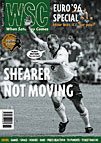 Germany's victory at Euro '96 produced an unforseen reaction among some of those watching it at home, as Uli Hesse-Lichtenberger reports
Germany's victory at Euro '96 produced an unforseen reaction among some of those watching it at home, as Uli Hesse-Lichtenberger reports
I knew he was going to miss. The set-up was too perfect for him not to miss: An evening at Wembley with the tournament on the line. He had had one of his half-baked games, had received a yellow card that would bar him from the final – and the he was the captain. Perfect. There was no question Möller would live up to his image of the underachieving genius cracking under pressure.
After the blast of a shot went in under the crossbar, I sat in stunned amazement and wondered how to react. You can allow yourself an outburst of emotion under such dramatic circumstances, can’t you? That’s the point of it all, isn’t it? Not for the Eurosport commentator, though. “They’ve done it again!” he yelled, and that’s when I gulped.
The German tabloids compulsively overdid it when they announced Football Ecstasy once everything was over. There were 30,000 people at Frankfurt Airport celebrating the champions of Europe – but my club could draw that many when it wins something at youth level. No: few people in this country get ecstatic about their national team.
People my age wasted the nights of their youth watching Schumacher break Battiston’s jaw. They suffered the most disgraceful match in living memory (that game against Austria in 1982) and saw their country’s team reach the 1986 World Cup Final for no apparent reason. And that may have been the worst part of it all – the winning. “They have done it again!” Few of us have any use for the admiration implicit in this yell; we only feel embarrassed.
And yet it didn’t feel wrong to back your country during Euro ’96. Because there were lost of ‘firsts’ in this campaign.
Let’s start with the manager. For the first time, Germany was led by a true loser-type. Berti Vogts has none of Beckenbauer’s charisma, Derwall’s arrogance or Schön’s elder-statesman charm. He’s the blue collar coach who speaks in a strangely artificial tone and picked Bierhoff because his wife told him to.
Then there was the team. For the first time Germany fielded an eleven without the customary scoundrel. Matthaüs was as vitriolic as usual, but he was at home; Basler, who has a reputation for blowing his lid in front of the cameras when things don’t go his way, was sent to see a surgeon before he could run amok. The whole squad was clearly infected with Klinsmannitis: No loose talk, no scandals – and no boasting. These lads sat down after a a victory and dissected their lukewarm performance!
Then there were the injuries. For the first time, Germany was not haunted by lucky breaks. Stupid yellow cards and torn ligaments cluttered the daily reports from England. Yes, another referee might have sent off Köpke (against Italy) and Klinsmann (against Croatia). But then again, another referee might have sent off Bilic and allowed the over-time goal against England.
And then, of course, there was the Daily Mirror. A friend at the BBC phoned me to say I’d better not look at the “filth”, but I took the whole thing as calmly as the German squad. It simply came as no surprise, considering the build-up to the England v Spain match; even Germany’s Bild headlined tamely. (What is going on? England is declaring a football war!)
Finally, there was the way the tournament shaped up: For the first time no clearly superior side went out before its time (like the USSR and Brazil always did in World Cups when I was a kid). Moreover, it was a tournament of non-existent first halves. Nearly all the games took off only after 45 minutes had been wasted – it was no longer a German speciality to worship patience.
For the first time, it was not embarrassing to support Germany. At times I even felt a curious form of relief at finally being allowed to root for a team representing my country. Until the semi against England, that is.
You could have promised the German players transfers to Milan – you still would not have heard a bad word about England from them. The empty seats were the doings of officials; the gory headlines were the doings of the gutter press; the riots after the semi were the doings of a minority. Even the sauna scandal couldn’t shake Vogts’ stoicism. Even the sauna scandal, when other guests at the team’s hotel were said to shocked by the sight of naked German footballers in their steam room: he joked about what different civilizations seem to wear in saunas and said everything’s fine, thank you.
This attitude filtered through to a nation hunched in front of TV sets, a nation that had been preparing for gang wars and marauding hooligans. The tournament off the field painted a positive picture of England as a football nation; and one game on the field painted a picture of England as a football team.
And that, to me, was the only thing about Euro ’96 that left a nasty taste: right when it felt decent again to support Germany, they kick the most interesting eleven out of the tournament – in a penalty shoot-out, the epitome of luck. And some bozo has to remark “They have done it again!”
From WSC 114 August 1996. What was happening this month